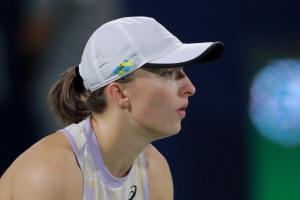|
Wimbledon banned players from the two countries
last year after the invasion, which Moscow calls a "special
military operation", but said in March that it would now accept
them as neutral athletes.
The 2022 tournament was the first time players were excluded on
grounds of nationality since the immediate post-World War Two
era, when German and Japanese players were banned from the
championships.
"After World War Two, German players were not allowed as well as
Japanese and Italian (players), and I feel like this kind of
thing would show the Russian government that maybe its not worth
it," Poland's Swiatek told the BBC on Wednesday.
"We are just athletes, a little piece in the world, but sport is
pretty important and sport has always been used for propaganda
... Tennis, from the beginning, could do a bit better in showing
everybody that tennis players are against the war.
"Tennis didn't really go that way, but now it would be pretty
unfair for Russian and Belarusian players to do that because
this decision was supposed to be made a year ago."
Russian and Belarusian players have been competing on the tours
and at the other Grand Slams as neutral athletes.
Belarusian Aryna Sabalenka, who won this year's Australian Open,
has said she struggled to understand the "hate" in the locker
room.
Swiatek described the locker room atmosphere as "pretty tense".
"It's not their fault they have a passport like that ... their
situation is pretty complicated and it's hard for them to speak
out loud about it," the 21-year-old said.
"On the other hand, we all have some kind of impact and anything
that would help stop the Russian aggression, we should go that
way in terms of the decisions the federations are making."
(Reporting by Hritika Sharma in Bengaluru; Editing by Peter
Rutherford)
[© 2023 Thomson Reuters. All rights
reserved.]
This material may not be published,
broadcast, rewritten or redistributed.
Thompson Reuters is solely responsible for this content. |
|





